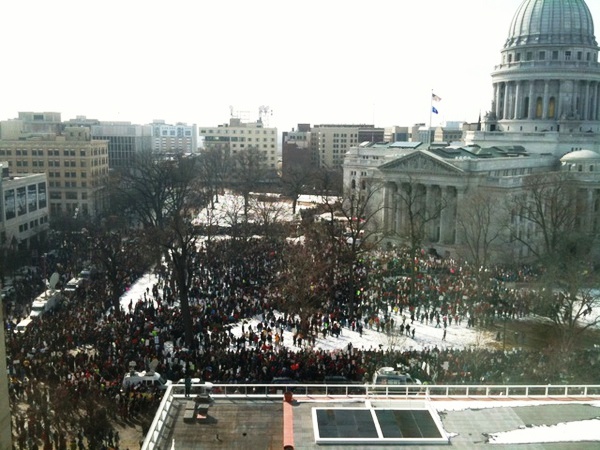
Up to 30,000 Wisconsin workers have packed streets outside state capitol since Feb. 15 to stop union-busting, pension attacks; teachers and students have walked out of class
Senate vote to end collective bargaining for most state workers delayed by opposition
Wis. union vote on hold after Democrats leave state
MSNBC.COM
MADISON, Wis. — Wisconsin state Senate Democrats boycotting a vote to curb the union rights of public employees left the state on Thursday while 25,000 critics of the bill marched on the state Capitol. At least nine protesters were arrested.
- 1. What’s at stake in Wisconsin
What bill would do
1) Eliminate collective bargaining rights for most public workers. So while unions still could represent those workers, they would not be able to seek pay increases above those pegged to the Consumer Price Index unless approved by a public referendum.
2) Unions also could not force employees to pay dues and would have to hold annual votes to stay organized.
3) Local police, firefighters and state troopers would retain their collective bargaining rights.
4) Public workers would have to pay half the costs of their pensions and at least 12.6 percent of their health care coverage. That represents an average of 8 percent increase in state employees’ share of pension and health care costs.
In exchange, public employees were promised no furloughs or layoffs. Gov. Scott Walker has threatened to lay off up to 6,000 state workers if the measure does not pass.
Estimated savings
$30 million by July 1 and $300 million over the next two years to address a $3.6 billion budget shortfall.
Background
The proposal marks a dramatic shift for Wisconsin, which in 1959 was the first to pass a comprehensive collective bargaining law for public employees and was the birthplace of the national union representing all non-federal public employees.
When voters last year elected Gov. Walker, an outspoken conservative, along with GOP majorities in both legislative chambers, it set the stage for a dramatic reversal of the state’s labor history.
National significance
New Republican governors and legislatures in other states have proposed cutting back on public employee costs to reduce budget shortfalls, but Wisconsin’s move appears to be the earliest and most extensive.
Source: Associated Press and Reuters
As ever-growing throngs of protesters filled the Capitol for a third day, the 14 Democrats disappeared around midday, just as the Senate was about to begin debating the measure, which would eliminate collective bargaining for most public employees.
They were not in their offices, and aides said they did not know where any of them had gone. Hours later, one member of the group told The Associated Press that they had all left Wisconsin.
“The plan is to try and slow this down because it’s an extreme piece of legislation that’s tearing this state apart,” Sen. Jon Erpenbach said in a telephone interview.
He refused to say where he was, but WTMJ later reported that they had fled to a hotel in Rockford, Ill.
Democrats hoped Republican Gov. Scott Walker and GOP lawmakers would consider revisions to the bill.
Walker, who took office just last month, called on Democrats to return out of respect for the democratic process and the institution of the Legislature.
“Their actions by leaving the state and hiding from voting are disrespectful to the hundreds of thousands of public employees who showed up to work today and the millions of taxpayers they represent,” Walker said.
Republicans hold a 19-14 majority in the Senate, but they need at least one Democrat to be present before voting on the bill.
Other lawmakers who fled sent messages over Twitter and issued written statements, but did not disclose their location. Erpenbach said they planned to gather in the same place later Thursday.
In response to a question of where she was, Sen. Lena Taylor sent a tweet saying she was “doing the people’s business. Power to the PEOPLE.”
As Republicans tried to begin Senate business Thursday, observers in the gallery screamed “Freedom! Democracy! Unions!” Opponents cheered when a legislative leader announced there were not enough senators present to proceed.
The sergeant-at-arms immediately began looking for the missing lawmakers. If he cannot find them, he’s authorized to seek help, including potentially contacting police.
Senate rules and the state constitution say absent members can be compelled to appear, but it does not say how.
“Today they checked out, and I’m not sure where they’re at,” Republican Senate Majority Leader Scott Fitzgerald said. “This is the ultimate shutdown, what we’re seeing today.”
STUDENTS WALK OUT TO SUPPORT THEIR TEACHERS; WATCH VIDEO AT
http://www.youtube.com/watch?v=xPLCFDFWRBk&feature=player_embedded
Elsewhere in the Statehouse, Democrats showed up in the state Assembly chamber wearing orange T-shirts that proclaimed their support for working families.
After a routine roll call, Democrats who were leaving the chamber exchanged high-fives with protesters, who cried “thank you” as they walked by. The protesters unleashed venomous boos and screams at Republicans.
Thursday’s events were reminiscent of a 2003 dispute in Texas, where Democrats twice fled the state to prevent adoption of a redistricting bill designed to give Republicans more seats in Congress. The bill passed a few months later.
The drama in Wisconsin unfolded in a jam-packed Capitol. Madison police and the State Department of Public Instruction estimated the crowd at 25,000 protesters, the largest number yet.
Demonstrators stood shoulder-to-shoulder in the building’s hallways, sat cross-legged across the floor and made it difficult to move from room to room.
Protesters clogged the hallway outside the Senate chamber beating on drums, holding signs deriding Walker and pleading for lawmakers to kill the bill. Some others even demonstrated outside the lawmakers’ homes.
Hundreds of teachers called in sick, forcing a number of school districts to cancel classes. Madison schools, the state’s second-largest district, with 24,000 students, closed for a second day.
Thousands more people, many of them students from the nearby University of Wisconsin, slept in the rotunda for a second night.
“We are all willing to come to the table, we’ve have all been willing from day one,” said Madison teacher Rita Miller. “But you can’t take A, B, C, D and everything we’ve worked for in one fell swoop.”
In addition to eliminating collective-bargaining rights, the legislation also would make public workers pay half the costs of their pensions and at least 12.6 percent of their health care coverage. Their share of pension and health care costs would go up by an average of 8 percent — increases Walker calls “modest” compared with those in the private sector.
Republican leaders said they expected Wisconsin residents would be pleased with the savings the bill would achieve — $30 million by July 1 and $300 million over the next two years to address a $3.6 billion budget shortfall.
“I think the taxpayers will support this idea,” Fitzgerald said.
Unions still could represent workers, but could not seek pay increases above those pegged to the Consumer Price Index unless approved by a public referendum. Unions also could not force employees to pay dues and would have to hold annual votes to stay organized.
In exchange for bearing more costs and losing bargaining leverage, public employees were promised no furloughs or layoffs. Walker has threatened to order layoffs of up to 6,000 state workers if the measure does not pass.
“We are all willing to come to the table, we’ve have all been willing from day one,” said Madison teacher Rita Miller. “But you can’t take A, B, C, D and everything we’ve worked for in one fell swoop.”

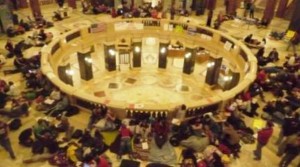
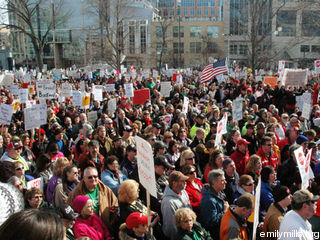
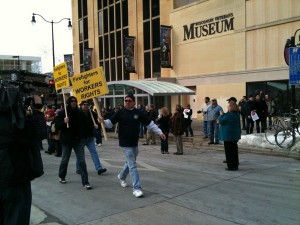
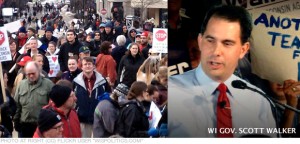
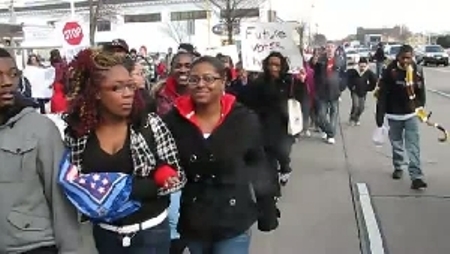
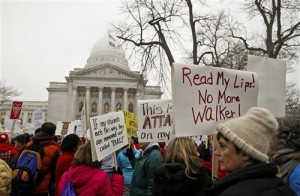




I’m glad for my school to be the one school that stood up to the problem of the bill and Scott Walker.